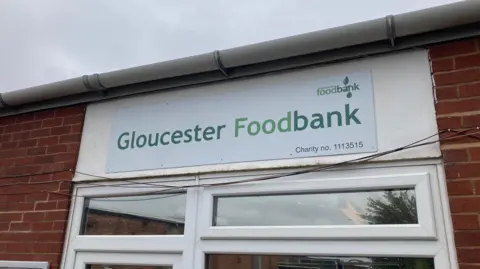In recent times, an increase in the demand for food assistance has raised concerns, as highlighted by Vicky Ranford, the new manager of the Gloucester Foodbank. Established in 2005, the food bank has seen a significant surge in operations, with the annual distribution of food parcels famously doubling to over 17,000 in the past five years alone. This trend is alarming, particularly as it indicates that many residents are still struggling with food poverty, a situation exacerbated by economic fluctuations and the lingering effects of the COVID-19 pandemic.
Vicky Ranford has revealed her astonishment regarding the level of assistance required, stating, “I wasn’t really aware just how busy it was and how many people are still struggling.” This statement underlines a pertinently overlooked aspect of everyday life, where many individuals remain oblivious to the extent of food insecurity in their midst. Despite gaining heightened public attention during the height of the pandemic, the ongoing crisis of food poverty seems to have faded from the mainstream narrative, even as the need persists unabated.
One of the core challenges facing food banks, as Ms. Ranford articulated, is the stigma that often accompanies the need for food assistance. This stigma discourages individuals from seeking help, leading to feelings of embarrassment. “People feel embarrassed about it, but the majority of us are only a paycheck or two away from needing help to buy food or essentials,” she stated. This statement is crucial in highlighting that socio-economic circumstances can change rapidly, and a majority of people could find themselves in precarious situations.
The Gloucester Foodbank aims to demystify these worries, assuring clients that there is no shame in reaching out for support. The overarching mission, according to Ranford, is to make people aware that it’s perfectly acceptable to seek help during difficult times. This help could mean the difference between having enough to eat and facing hunger, which is a situation no one should have to endure.
To commemorate the food bank’s 20th anniversary, a campaign has been initiated to amplify their outreach efforts, seeking financial contributions, and soliciting more volunteers. It’s a call to action for the community to rally behind a crucial service that sustains the lives of countless individuals and families. The fundraising efforts are not just about feeding people but also about reducing barriers and fostering empathy to encourage community involvement.
The multifaceted issue of food poverty is interlinked with other social concerns, such as the rising cost of living that many families are currently grappling with. The environment has shifted sharply in recent years, and individuals may find themselves battling unexpected financial burdens. Foodbanks play a vital role in mitigating these struggles, providing not only nourishment but also a sense of community and support.
The ongoing narratives about food poverty are not merely statistics; they represent real people facing harsh realities. Local stories like those from the Gloucester Foodbank are reminders that, in moments of crisis, human connection and assistance become paramount. Misfortune can befall anyone, and it is critical that communities remain vigilant and responsive to those in need.
As awareness grows, the hope is that these stories resonate, helping to unravel stigma while fostering compassion. The Gloucester Foodbank stays dedicated to its mission, embodying resilience and community spirit as they adapt to meet the evolving needs of individuals facing food insecurity. By lifting up their voices and sharing their stories, they aim to ensure that help is always accessible, timely, and devoid of judgment.











